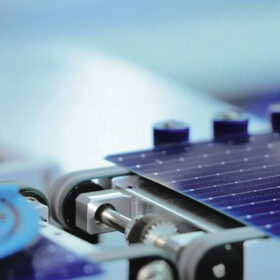He called for the government to change the criteria to assess solar feed-in tariffs to recognise the multitude of benefits solar energy brings.
NSW Greens energy spokesman Jeremy Buckingham said:
“If the NSW Government are serious about supporting renewable energy then they should be saying wrong way, go back to IPART,” said Greens MP Jeremy Buckingham.
“NSW should be ensuring that electricity retailers pay a fair price for the solar electricity that is fed into the grid from roof top systems, which takes into account the avoided health and carbon costs solar brings by reducing the amount of fossil fuels that are burnt.
“This proposed reduction in the benchmark price paid for households generating solar electricity from 11 cents per kilowatt hour in 2017/18 to 8 cents in 2018/19 is a direct result of the NSW Governments failure to instruct IPART to assess the true value of solar power.
“Unless the NSW Government steps in then this decision will be a huge hit to the electricity bills of over 400,000 households and businesses that have installed solar panels in NSW and will act as a disincentive to further uptake of solar panels.
“Solar power is working to even out demand peaks and reduce electricity prices. Households and businesses should be rewarded for this service, not penalised for the benefit of big coal,” Mr Buckingham said.
NSW Greens Renewable Energy Spokeswoman Tamara Smith said:
“The Greens recognise that solar power leads to cleaner air, reduced carbon emissions and cheaper electricity. The uptake of solar power should be encouraged and that is why the Greens have introduced a Bill into the NSW Parliament to ensure a minimum, fair price for solar.”
Tamara Smith has introduced the Electricity Supply Amendment (Fair Price for Solar) Bill 2018 into parliament on behalf of the Greens. The Bill will replicate the Victorian criteria for establishing a mandatory minimum price which includes valuing the avoided health and carbon costs solar brings by reducing the amount of fossil fuels that are burnt, and by recognising the reduced spend of infrastructure.
Quote from the Issues Paper where IPART flags a reduction in the solar feed in tariff:
Our preliminary modelling is suggesting that in 2018-19, on average across the day the value of solar exports is around 8-9 cents per kilowatt hour for solar electricity. This is lower than our forecast of the value of solar electricity across the day for 2017-18. The main reason for this is that ASX baseload electricity contract prices are indicating that average prices for wholesale electricity next year will be lower in 2018-19, as substantial new generation capacity is expected to enter the market (mainly large-scale renewables). These suggest average wholesale prices will fall to around 8c/kWh, compared to around 11c/kWh when we published our Final Report last year.
Quote from the Issues Paper where IPART recognises the benefits of solar:
In addition, the increasing penetration of solar electricity in NSW over time has meant that less electricity needs to be produced by power stations in the middle of the day and into the afternoon. Over the years this has contributed to a lower number of price spikes for wholesale electricity over the whole afternoon period when solar is exporting to the grid.
Therefore on average, the difference between the price of wholesale electricity when solar is exporting, compared to the price of wholesale electricity at all other times is reducing.”






By submitting this form you agree to pv magazine using your data for the purposes of publishing your comment.
Your personal data will only be disclosed or otherwise transmitted to third parties for the purposes of spam filtering or if this is necessary for technical maintenance of the website. Any other transfer to third parties will not take place unless this is justified on the basis of applicable data protection regulations or if pv magazine is legally obliged to do so.
You may revoke this consent at any time with effect for the future, in which case your personal data will be deleted immediately. Otherwise, your data will be deleted if pv magazine has processed your request or the purpose of data storage is fulfilled.
Further information on data privacy can be found in our Data Protection Policy.